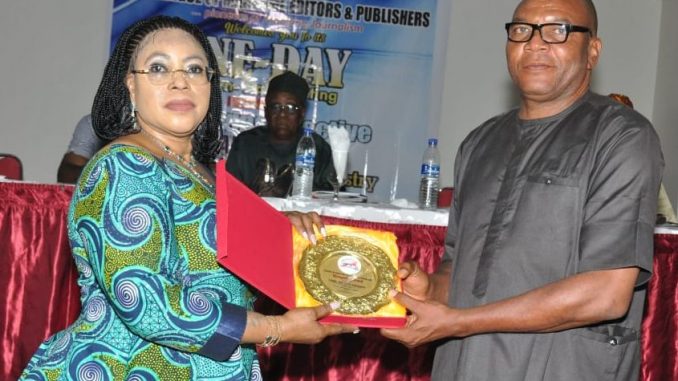
The Chairman, Seaport Terminal Operators Association of Nigeria (STOAN), Princess Vicky Haastrup, has advised the Federal Government to work with operators to turn the nation’s seaports to smart ports by deploying a Customs-driven, port-wide, cloud-based software that will create new operational flows, which will eliminate human contacts, expunge all forms of manual processes from the system and help the port function better.
In her presentation titled “Impact of automation in cargo handling operation” at a town hall meeting on achieving effective digitalisation in the Nigerian maritime sector organised by the League of Maritime Editors in Lagos on Thursday, Haastrup said Customs processes must be simplified and automated to complement the gains recorded through the Federal Government’s port reform.
“The time is ripe to deploy the much talked about National Single Windows and e-Customs to check manual Customs processes and the multiplicity of Customs units deployed all around the ports, the port gates and even on the roads to intercept cargoes already cleared from the port,” she said.
“As operators, we know that automation provides smart solutions for the services that we render. Automation helps us to deliver operational efficiency, improve operational processes, and promote a safer working environment and culture. Technology helps our terminals work better, faster and smarter.”
She said an integral part of the reform 2006 port reform was the concession of terminal operations to reputable private terminal operating companies. The port concession exercise, according to her, has improved the competitiveness of Nigeria ports.
“Before the concession, port infrastructure had deteriorated; cargo-handling equipment were grossly insufficient. The available equipment were outdated and malfunctioning due to poorly trained manpower, corruption in the equipment procurement process, and poor maintenance.
“Before the port concession of 2006, the ports were poorly maintained and poorly managed. Ships were made to wait for as much as 45 days after arriving Nigeria before they could berth. Consignees were made to go through harrowing experiences and had to wait for up to 60 days to find their cargo among poorly arranged stacks. The hapless consignees had to pay bribes to take delivery of their cargoes when they eventually locate them. The ports were very porous; security was lax, giving unhindered access to all and sundry. Wharf rats were the kings of the port at the time.
“During those dark days, shipping lines employed the services of third party equipment hirers even after paying for the same service inside the port,” she said.
She said the fortunes of the ports turned around for good after private terminal operators assumed responsibilities for cargo handling operations.
She said the port concessionaires have increased the efficiency and productivity of the ports, reduced vessel waiting time, reduced the cost of doing business at the port, freed government resources for use in other vital sectors, increased the revenue of government generated through the seaports and generates more jobs.
“Terminal operators in collaboration with the Nigerian Ports Authority have improved the state of the ports in terms of security, quay and yard infrastructure, navigation channels, productivity and efficiency.
“The efficiency of our ports has improved multiple folds. Vessel waiting time has since been eliminated resulting in significant savings for importers and exporters. Government now generates revenue in trillions of Naira – through the tax authorities, Customs, NPA and NIMASA – as against the few billions generated before the concession,” she said.
The STOAN Chairman also said that terminal operators in the six seaports across Nigeria have effectively deployed technology to drive their operations.
“Consignees and their agents do not need to be at the port physically with regards to their transactions with terminal operators,” she said.
Princess Haastrup blamed the manual processes adopted by the Nigeria Customs Service (NCS) during cargo clearance for the high cost of doing business at the port. Customs processes, according to her, “must be simplified and automated to complement the gains recorded through the Federal Government’s port reforms”.
She also asked Customs to embrace the use of scanners to reduce the high rate of 100% physical examination of cargoes prevalent at the port.
Source: Ships&Ports
